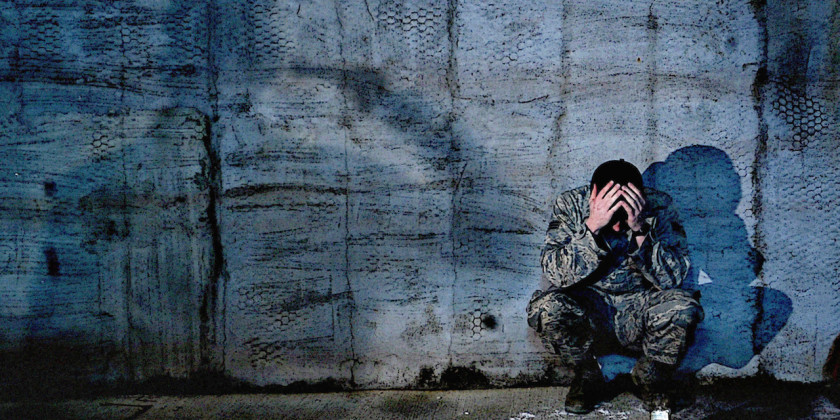
This week we are honored to share Eileen’s story of finding purpose after her husband’s suicide. Veteran suicide has become all too common in our society. Please take time to share this article, to help educate the general population on how many veterans are lost to suicide. Those who defend our country shouldn’t be left to their own devices when they return. Thank you Eileen for not only sharing your story, but bringing light to a topic that needs more attention.
My husband became a Veteran suicide statistic on October 21st, 2013. He was one of the 22 members of the retired U.S. Military that died that day. Brian was a Navy Corpsman in the late 70s during peacetime. After his service, it was a natural transition to become a paramedic where he saw combat daily on the streets of Chicago. The trauma he faced on each shift…stabbings, shootings, child abuse, domestic violence and more…could have earned him a Purple Heart. Brian was a character…funny, charismatic, a prankster, compassionate, and enjoyed life to its fullest. His most loyal role was that of being a father to his 4 children. A week prior to his death, he was on a cruise with his family tearing up the dance floor on the ship (oh, how he loved to dance!).
The latest statistics from a comprehensive study of 50 million Veteran records from 1979 to 2014 from every state of the nation produced quantifiable evidence of suicide among service members. In 2014, an average of 20 Veterans died from suicide each day and only 6 of the 20 used VA services. Veterans accounted for 18% of all deaths from suicide among U.S. adults, while Veterans constituted 8.5% of the U.S. population.
Approximately 66% of all deaths from suicide were the result of firearm injuries, which also holds true of my husband’s death. He retired from the Chicago Fire Department and became a bailiff in a courthouse in Florida. Unfortunately, a service gun provides the quickest outcome. It does not provide them the opportunity to think about what they are doing or the possibility of being rescued. Rarely does someone survive a gunshot wound to their head.
Fast forward 6 months after Brian’s death, I became a Nurse Educator at a VA hospital working with primarily Iraq and Afghanistan Veterans who suffered a traumatic brain injury (TBI) while in combat. I was sitting in my office during my orientation and met my first TBI patient. Afterwards, I asked my colleague what caused his head injury, thinking it was a due to combat. She said it was “a result of a self-inflicted gunshot wound to his head. The bullet is still in his brain.” He was alert, walking, and talking. I was briefly paralyzed in my chair. “What did I get myself into?” Little did I know that this new nursing role would eventually help convert my pain into my purpose. Without resolve, my mission became to work with Veterans who had attempted suicide, are actively suicidal, or have lost battle buddies to suicide.
Nine months after Brian’s death I received a text message from a friend in Florida asking me for help on how to comfort her children. Brian’s good friend, who was also a Bailiff and Veteran of the Gulf War, died by suicide. Could he have identified with Brian’s death and decided it was an option for him as well? My mind flooded with emotions. I knew all too well what the next days, months, and years would be like for her children because of their father’s tragic death.
Many times Veterans will have lost more of their platoon to suicide than combat. It is undeniably the aftermath of war that plagues them the most. These men and women came home with each other after facing death daily in Iraq or Afghanistan thinking the carnage would be over, only to find out those buddies who they shared their lives with for 6 months or more decided to end their lives. These are only 2 statements of the hundreds I have heard: “When he hung himself, that was my defining moment. Either I was going to join him or get help.” “I was Special Ops and so far I have lost 6 buddies to suicide.” I cannot begin to tell the number of devastating stories I have heard in the nearly 4 years that I have been at the VA.
We rely on statistics to try to understand since we can get carried away in assumptions that may not be reality. There is continued evidence of high burden of suicide among middle-aged and older adult Veterans. In 2014, approximately 65% of all Veterans who died from suicide were aged 50 years or older. Yes, Veterans die at a higher rate than the general public. No, combat Veterans do not kill themselves at a higher frequency than those who have not been deployed to combat areas. Yes, the War on Terror Veterans are dying by suicide at a significantly higher rate than any other war in history.
Many Veterans suffer from Moral Injury, which is the damage done to one’s conscience or moral compass when that person perpetrates, witnesses, or fails to prevent acts that transgress their own moral and ethical values or code of conduct. It is a soulful wound that may take years to recover from if at all. Stories of combat Veterans witnessing their friend detonate in front of them while stepping on an explosive buried underground or having to kill a woman charging at them with a rocket in her hand plays over and over in their minds when they get home. They had to do the unimaginable. Our soldiers and Veterans often suffer in silence. Yes, we know that war kills, but these men and women had unthinkable targets with multiple deployments to help engrain it all as permanent memories. Do they sleep? No. They often have high divorce rates and live in isolation. They are hypervigilant, angry, irritable, and suffer with memory impairments. Sometimes they feel that suicide will take away their suffering and make it easier on their families. And, when they hear a battle buddy died, they might identify with that option as well.
The Veterans Administration is aggressively undertaking measures to prevent suicide. It is the number one priority in the VA. They have exponentially expanded the Veterans Crisis Line (they have answered nearly 3 million calls to date) and suicide prevention staff at every VA, developed predictive analytics to identify those at risk for early intervention, bolstered mental health services for women, expanded TeleMental health services for Veterans who live too far from their local VA, developed free mobile apps to help Veterans and their families, and are networking with Vet Centers, community-based organizations as well as establishing innovative public-private partnerships to reach Veterans. For a complete report of VA suicide statistics and prevention, please visit: https://www.mentalhealth.va.gov/suicide_prevention/Suicide-Prevention-Data.asp
My husband’s death was devastatingly the most painful thing that his children and I have endured, but I know that he would be proud of my efforts in helping to create this group for survivors. LOSS has met, and continues to meet the needs of survivors and my hope for all survivors is that they find a way to convert their pain into something meaningful.
Veterans Crisis Line: 1-800-273-8255 and then press #1.
Veterans Suicide Loss Group in the Chicagoland Area
3rd Tuesday of the Month
1-3 pm
Hines VA Campus
Bishop Goedert Residence
53 Tripp Ave, Bldg 53
Hines, IL 60141




Your comments whole true not only for our government military Warriors but also for our non government military, those Warriors who never gained entry. These Warriors fought for our country through private Contracting agencies that our government hired to protect us as well. The moral injury my loved one suffered on a daily basis while dealing with extreme pain from a non-combat disease and fueled with alcohol was totally unbearable for him. Being totally committed to this man as I was, but not married, I struggled watching this never-ending struggle within him. He did not sir-come to taking his own life but I was prepared mentally if he did. His battle with moral injury, his disease and alcohol, took his life last year. He is with the Lord now and I know God felt this was the best for my love. The struggles I witnessed in the man I loved will always haunt me. I never knew or realized that fighting for our country’s rights as a warrior for either side could have such a grave impact on one’s life known as moral injury. May God be with us all.
C.M. You are absolutely correct. Although my experience has only been with Veterans at the VA, people do not realize the number of men and women who experienced Moral Injury as a government contractor. I am truly sorry for your loss…
Eileen, thank you for sharing your story. I am so sorry to hear about your husband’s death. Though I have known about the high incidence of suicides among vets, you have opened my eyes to the devastation and horrific struggle this population endures. Kudos to you for all you have done in educating others and supporting this important cause.
Thank you Tish for your heartfelt comments…it helps validate my efforts in helping our Veterans who have served our country. You are very kind.